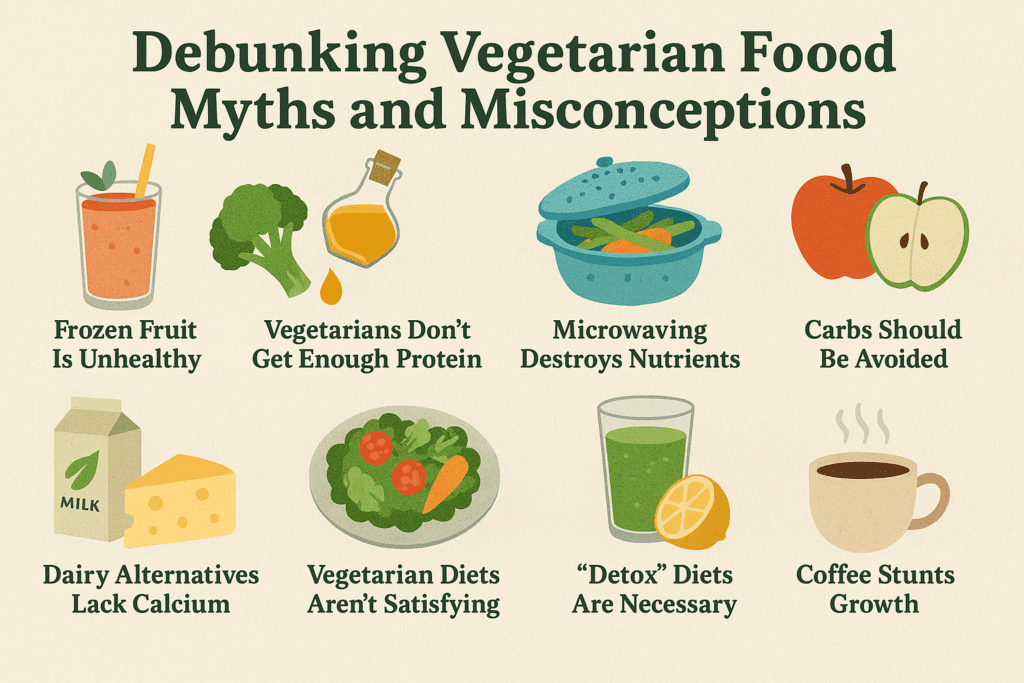Table of Contents:
| # | Section Title |
|---|---|
| 1 | Introduction |
| 2 | Myth 1: Eating Fat Makes You Fat |
| 3 | Myth 2: Microwaving Food Destroys Nutrients |
| 4 | Myth 3: Fresh Vegetables Are Healthier Than Frozen |
| 5 | Myth 4: Carbs Are Bad for You |
| 6 | Myth 5: Eating Late at Night Causes Weight Gain |
| 7 | Myth 6: Organic Food Is Always Better |
| 8 | Myth 7: Detox Diets Cleanse Your Body |
| 9 | Myth 8: Dairy Is Essential for Calcium Intake |
| 10 | Myth 9: MSG Is Harmful |
| 11 | Myth 10: Coffee Stunts Your Growth |
| 12 | FAQs |
| 13 | Conclusion |
Introduction
Food myths have been passed down for generations, often causing unnecessary dietary restrictions and confusion. In this article, we will debunk 10 of the most common vegetarian food misconceptions and provide science-backed truths.
1. Myth: Eating Fat Makes You Fat
Truth: Healthy fats are essential for the body and do not directly lead to weight gain.
Fats are often demonized, but not all fats are harmful. Healthy fats, such as those found in avocados, nuts, and olive oil, support brain function and heart health. Weight gain is primarily caused by consuming excess calories, regardless of the macronutrient.
2. Myth: Microwaving Food Destroys Nutrients
Truth: Microwaving preserves nutrients better than some other cooking methods.
Studies show that microwaving food actually retains more nutrients compared to boiling or frying because of the shorter cooking time and minimal water usage.
3. Myth: Fresh Vegetables Are Healthier Than Frozen
Truth: Frozen vegetables can be just as nutritious as fresh ones.
Vegetables are often frozen at peak ripeness, preserving their nutrient content. Fresh vegetables, on the other hand, can lose nutrients over time due to transport and storage.
4. Myth: Carbs Are Bad for You
Truth: Not all carbs are unhealthy; complex carbohydrates are essential.
Whole grains, fruits, and vegetables provide necessary fiber, vitamins, and minerals. Refined carbs like white bread and sugary snacks are the real culprits behind weight gain and blood sugar spikes.
5. Myth: Eating Late at Night Causes Weight Gain
Truth: Weight gain depends on total calorie intake, not the timing of meals.
Eating late only leads to weight gain if it results in consuming more calories than needed. However, late-night snacking on high-calorie foods may contribute to unhealthy habits.
6. Myth: Organic Food Is Always Better
Truth: Organic food is not necessarily more nutritious than conventional food.
While organic food avoids synthetic pesticides, studies show that both organic and conventional foods have similar nutritional values.
7. Myth: Detox Diets Cleanse Your Body
Truth: Your liver and kidneys naturally detoxify your body.
Detox diets claim to remove toxins, but the human body is well-equipped to detoxify itself through the liver and kidneys.
8. Myth: Dairy Is Essential for Calcium Intake
Truth: Many plant-based sources provide ample calcium.
While dairy is a common source of calcium, it is not the only option. Leafy greens like spinach and kale, fortified plant-based milks, almonds, and sesame seeds are excellent calcium sources for a vegetarian diet.
9. Myth: MSG Is Harmful
Truth: MSG is safe for most people and enhances flavor.
Despite the myths, research shows that monosodium glutamate (MSG) is safe in moderate amounts and does not cause adverse health effects in most individuals.
10. Myth: Coffee Stunts Your Growth
Truth: There is no scientific evidence that coffee affects height.
Coffee contains caffeine, which may temporarily impact sleep, but it does not interfere with growth in children or teenagers.
FAQs
1. Are frozen fruits as healthy as fresh ones?
Yes, frozen fruits retain most of their nutrients and can sometimes be even fresher than produce that has traveled long distances.
2. Can you eat too many healthy fats?
Yes, while healthy fats are beneficial, excessive intake can lead to weight gain if calorie intake exceeds energy expenditure.
3. Is drinking water with meals bad for digestion?
No, drinking water with meals does not dilute digestive enzymes; it actually aids digestion.
4. Does sugar cause hyperactivity in children?
There is no strong scientific evidence linking sugar consumption to hyperactivity in children.
5. Are gluten-free foods always healthier?
No, gluten-free products can still be high in sugar and unhealthy additives.
6. Should I avoid dairy for better digestion?
Unless you are lactose intolerant, dairy alternatives like almond milk, soy milk, and coconut milk can provide essential nutrients.
Conclusion
Many common food myths have been debunked by science, yet misinformation continues to spread. Understanding the truth behind these misconceptions allows for healthier, more informed food choices. Next time you hear a food myth, take a moment to research before believing it.
🚀 Let’s Connect!
Looking for expert insights on website development, SEO, and online business growth? Connect with me on LinkedIn or reach out via my website!
🔗 Connect on LinkedIn 📩 Contact Me



